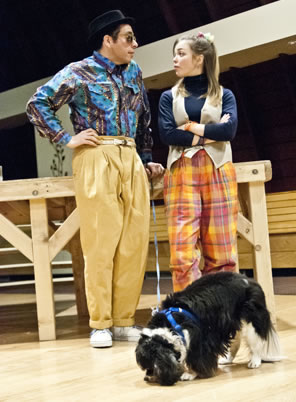The Two Gentlemen of Verona
The Two Self-Absorbed Men of '91
Chesapeake Shakespeare Company, The Other Barn, Columbia, Md.
Saturday, March 2, 2013, Second row, right of stage in box theater
Directed by Patrick Kilpatrick

Vince Eisenson, left, as Proteus, and James Jager as Valentine in the Chesapeake Shakespeare Company's production of The Two Gentlemen of Verona. Photo by Teresa Castracane, Chesapeake Shakespeare Company.
Patrick Kilpatrick has been pondering The Two Gentlemen of Verona since he first read it. That was in 1993, about the time the Menendez Brothers and William Kennedy Smith were making headlines in their murder and rape trials, respectively. Kilpatrick saw Valentine and Proteus in the same light as those famous scions, wealthy young men with an inherent sense of entitlement that brooks no social, moral, or even legal borders. Now directing this incongruous mess of a play for the Chesapeake Shakespeare Company, he employs that context, providing a thematic avenue to carry us through the play's unsatisfying ending. However, Kilpatrick inexplicably adds his own incongruities that diminish the play's one sure-fire attribute, the comedy of Launce and Speed.
The production is set around 1991 in costume. There is no set. The Other Barn is a barn-like dance hall, with the dance floor serving as the stage, surrounded by audience seating: the actors and action emerge from the surroundings. Frankly, the play's setting itself could have emerged from its surroundings, too; 1991 seems an arbitrary date, given Kilpatrick's concept. Even as I'm writing this comes news that former South Carolina Governor Mark Sanford has asked his ex-wife to run his congressional campaign—three years after he dumped her for his Argentinian "soul mate," whom he is planning to marry. There's a Valentine and Proteus rolled into one.
In the first scene we get a sense of the true nature of Verona's two gents when a woman wearing a black slip dress and carrying her shoes walks on, pauses to look at Proteus (Vince Eisenson), and continues across the stage. The woman is only identified as Random Girl (Amanda Bennett) in the cast list, but she serves as the starting reference point for Valentine (James Jager) chiding Proteus on the topic of love.
Eisenson's Proteus is totally amoral. He seems trustworthy, devoted to both best friend Valentine and girlfriend Julia (Megan Dominy), but as the play progresses we see his behavior, even his gait, as totally self-absorbed. His soliloquies are manifestations of the entitlement argument: He should have Silvia (Ty Hallmark) and betray Valentine and Julia because it serves his desires. "Methinks my zeal to Valentine is cold, and that I love him not as I was wont. O, but I love his lady too too much, and that's the reason I love him so little." He shrugs off any and all accountability. "Love bade me swear, and Love bids me forswear; O sweet-suggesting Love, if thou has sinned, teach me, thy tempted subject, to excuse it."
What he can't conceive is that by betraying his best friend and girlfriend, he would end up being loathed by the object of his desire, Silvia. This would seem like a "duh!" to the rest of us, but Eisenson's Proteus is genuinely puzzled that Silvia should despise him so much, and he is peeved when she keeps harping about Julia and Valentine, who are so far from his conscience that he blithely claims they are dead. When Proteus gives the disguised Julia her ring to take to Silvia and calls it something a woman who "loved me well" gave him, Julia's impulsive cry of "Alas!" prompts Proteus to respond with "Why dost thou cry 'Alas'?" Eisenson speaks this in a tone that could rephrase the question as "What's the big deal?"
As full of self as these two young men are, they are no match for the Duke, whom Michael P. Sullivan plays as an oily politician with a Tammany Hall boss lurking underneath the statesman veneer. The Duke's trapping of Valentine, who is preparing to elope with Silvia, reads as a poorly executed attempt by Shakespeare to drag out dramatic tension, but Sullivan's Duke turns this sequence into a game, seeing how far he can push the none-too-bright Valentine. This Duke puts a similar squeeze on Proteus. After he has banished Valentine on Proteus' report and now enjoins Proteus to help turn Silvia's affections toward Thurio, the Duke says, "We dare trust you in this kind because we know, on Valentine's report, you are already Love's firm votary, and cannot soon revolt and change your mind." The line might be full of irony, but Sullivan delivers it with an I-know-more-than-you-think-I-know tenor. Proteus, though, skates along, unheeding the gunshot sound of cracking ice implied in Sullivan's delivery.
Sullivan also delivers the line that resonates most in this production. "Wilt thou reach stars because they shine on thee?" he asks Valentine. Casey Kasem always told us to keep reaching for the stars, but to stake claim to them as your privileged domain is delusional.
These are the readings that help us get through the play's incomprehensible ending of Proteus trying to rape Silvia, Valentine stopping the assault but, after Proteus protests his shame and guilt, offering his estranged friend "All that was mine in Silvia I give thee." Even in this production, this moment still jars. Kilpatrick, though, has inserted another key piece of stage business for Silvia, who Shakespeare keeps mute from this point on to the end of the play. After stopping the assault—but before offering Silvia up to his best bud—Valentine asserts that he has been left completely friendless because of Proteus's perjury. "Proteus, I am sorry I must never trust thee more, but count the world a stranger for thy sake." Hallmark's Silvia turns away at this moment, realizing she is a mere asteroid passing through Valentine's self-universe. Even after Valentine denounces Thurio for her sake, Silvia cannot be reconciled to him. That Silvia need not have anything to do with Valentine at play's end is perfectly acceptable in that her silence allows a director and the actress playing her to do anything they want with the character at this point.
Nor can Dominy's Julia reconcile to Proteus. "Bear witness, heaven, I have my wish forever," Proteus says upon reuniting with her. "And I mine," Julia says, which Dominy follows with a resounding slap to Proteus's face. As the rest of the scene plays out, Eisenson's Proteus and Jager's Valentine resume their own bromance, as if all that has passed were of no consequence (including Julia's slap—Proteus has already shoved it deep into his subconscience). And so they head off stage arm in arm. But as the two women watch them go, they take each other's hands and walk off in the other direction.
Then Speed (Jessica Shearer Wilson) and Launce (Jose Guzman) have a tender moment before she entices him to follow the ladies instead of their masters. Yes, Shakespeare's uncertain ending is replaced with Kilpatrick's equally puzzling ending. Speed is a woman in this production, which in itself is a nonissue (all "boy" references to Speed become "girl"), and Wilson plays her with easy wit and charming personality. But this Speed also has a crush on Launce, which is behind the illogic of the new ending and, more regrettably, leads to cutting the scene in which Speed reads the inventory of qualities in the milkmaid Launce plans to marry. Launce's scenes are unarguably Two Gentlemen of Verona's chief value, including the milkmaid letter. With a talented Speed and Launce, as this production has in Wilson and Guzman, cutting any of these scenes robs the audience of some great Shakespeare.

Jose Guzman as Launce, Jessica Shearer Wilson as Speed, and Norton as Crab. Photo by Teresa Castracane, Chesapeake Shakespeare Company.
Jonas David Grey, on the other hand, adds unexpected quality to the play with his revealing portrayals of both Panthino, Antonio's servant—who shows unfettered disdain for Antonio's spoiled son, Proteus—and Thurio. This Thurio isn't quite as foolish as Valentine, Proteus, and even Julia make him out to be. He's a man whose "possessions are so huge" but who hasn't learned the nuances of social interaction, and so he clumsily attempts to cling to power by proximity alone. Grey's Thurio is determined to be always in the physical vicinity of Silvia, and when he's not he nervously seeks her out with such a sense of insecurity we almost feel pity for him. He has no conception of love; he only knows that Silvia is a prize proffered on him, and it is actually the men who would intervene—Valentine, Proteus, and Eglamour—that prompts emotional reactions from him in the way of fear and anger.
Dominy is a strong-willed Julia, and it is her determination that leads to her failure to see beyond Proteus's facade. She yet has moments of real fear, heavy heartache, silliness, and her own self-absorption. Dominy manages a steady performance in spite of Shakespeare's unsteady hand in Julia's portrayal. We get a nice moment when she tapes together the shreds of Proteus' letter that she had ripped up. However, she is doing this upstage as Proteus is speaking his second, key soliloquy downstage, and so this extra-textual visual irony distracts from the play's verbal pivot-point. From a theatrical perspective, the timing of Julia taping together the letter might better serve her earlier scene with Lucetta (Jenny Leopold) when Julia decides to follow Proteus; at least then it wouldn't become a disservice to Proteus's key moment.
Guzman as Launce also has to compete with a visual distraction—Norton, a King Charles spaniel playing Crab. Of course, the cute dog is part and parcel of any actor's lot in playing Launce, and Guzman's performance is strong enough to rival his costar's cuteness. Norton seems too pretty a dog to be playing Crab, a cur disdained by most other characters in the play. This production doubles up the dogs by including Proteus's Dog, Ralph, a gorgeous tan and white King Charles spaniel, wearing a red bow, that Launce leads across the stage after Proteus has told his servant to "find my dog again, or ne'er return again into my sight."
Despite Kilpatrick's thematic aim and the cutting of the Speed-Launce scene, this production plays up much of the comedy written into the play, and then some. The scenes with the outlaws, which can play like the Monty Python troupe on a quest for the Holy Grail, show much promise in the hyperantics of Leopold and Greg Burgess (who also plays Eglamour), while Jager's Valentine takes on a humorously fiendish demeanor when he tells the outlaws he was banished for killing a man. Unfortunately, Frank B. Moorman (who otherwise does good turns as Antonio and the Host) gives Outlaw 2 an excessive stutter. If it were integral to the plot, a stutter might be justified, at least, but treating a speech impediment as comedy for its own sake is as unnecessarily cruel as Proteus' oblivious disdain for the feelings and well being of others.
Eric Minton
March 6, 2013
A version of this review also appears on PlayShakespeare.com
Comment: e-mail editorial@shakespeareances.com.
Start a discussion in the Bardroom



 Find additional Shakespeareances
Find additional Shakespeareances